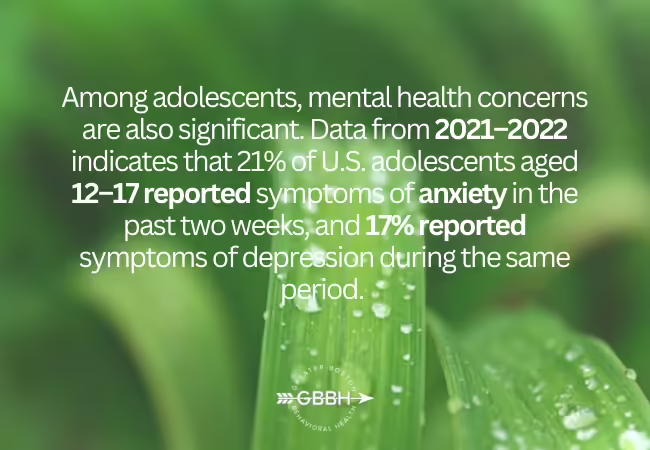Hope is a transformative force that fuels resilience, fosters optimism, and inspires change. For individuals facing mental health challenges, hope is more than a feeling—it is a guiding principle that enables them to take steps toward healing and recovery. At Greater Boston Behavioral Health, we emphasize the critical role of hope in our therapeutic programs, empowering individuals to envision and work toward brighter futures.
This blog explores the profound impact of hope on mental health, its integration into therapy, and practical ways to nurture it for lasting change.
The Power of Hope in Behavioral Health
Hope is an active process that combines the belief in positive outcomes with the motivation to achieve them. It is not simply wishing for better days but creating a realistic pathway to achieve goals while staying resilient in the face of challenges.
For those struggling with mental health concerns, hope acts as an anchor, helping them navigate the stormy waters of depression, anxiety, trauma, or other disorders. Research highlights the link between hope and mental health recovery, showing that individuals with higher levels of hope are more likely to experience:
- Reduced Symptoms of Mental Illness: Hope helps lower levels of anxiety, depression, and stress by creating a sense of control over the future.
- Enhanced Problem-Solving Abilities: Hopeful individuals are better at identifying solutions to their problems and taking proactive steps to address them.
- Improved Resilience: By focusing on achievable goals, hope builds emotional and psychological resilience, enabling individuals to handle setbacks effectively.
Integrating hope into behavioral health programs can significantly improve outcomes and foster long-term well-being.
The Importance of Hope in Mental Health
Hope is a cornerstone of mental health recovery. It provides individuals with the strength to face challenges, the motivation to pursue treatment, and the belief that a better future is achievable. In mental health treatment programs, fostering hope is essential, as it helps clients shift from feelings of despair to a mindset of possibility and progress.
Hope is not just about optimism; it is a dynamic and active process. It encourages individuals to set goals, envision positive outcomes, and take actionable steps toward improving their well-being. At our Mental Health Treatment Center in Boston, hope is woven into every therapeutic approach, empowering clients to believe in their ability to overcome obstacles and embrace healing.
Hope-Centered Care at Greater Boston Behavioral Health
At Greater Boston Behavioral Health, hope is central to everything we do. Through personalized Mental Health Treatment Programs, we help clients rediscover their sense of purpose and regain confidence in their ability to overcome challenges. Our therapeutic approaches, such as Cognitive Behavioral Therapy (CBT) and Dialectical Behavior Therapy (DBT), are designed to nurture hope and facilitate meaningful change.
Cognitive Behavioral Therapy (CBT)
CBT helps clients identify and challenge negative thought patterns that may contribute to feelings of hopelessness. By reframing these thoughts, clients can develop a more optimistic and constructive outlook on life. Key components of CBT that support hope include:
- Goal-Oriented Strategies: Encouraging clients to set realistic, achievable goals fosters a sense of accomplishment and purpose.
- Cognitive Restructuring: Replacing pessimistic beliefs with more balanced and hopeful perspectives.
- Behavioral Activation: Promoting engagement in positive activities that reinforce progress and build confidence.
Dialectical Behavior Therapy (DBT)
DBT combines acceptance-based strategies with actionable tools for change. This therapy is particularly effective for individuals experiencing intense emotions or distress. DBT enhances hope by:
- Teaching clients to regulate their emotions and reduce feelings of overwhelm.
- Building skills for effective communication and relationship management, which foster supportive connections.
- Encouraging mindfulness practices to keep clients focused on the present and reduce anxiety about the future.
Both CBT and DBT are cornerstones of our Mental Health Therapy Programs, ensuring that hope remains a driving force throughout the recovery process.
The Psychological Impact of Hope
The presence of hope has profound effects on mental health. Research consistently shows that hope is associated with:
- Reduced Symptoms of Mental Illness: Hope acts as a buffer against anxiety, depression, and stress, offering a sense of control over uncertain situations.
- Improved Resilience: Individuals with hope are better equipped to bounce back from setbacks and manage life’s challenges effectively.
- Enhanced Coping Skills: Hopeful individuals tend to approach problems with a solution-focused mindset, exploring multiple pathways to overcome difficulties.
When individuals feel hopeful, they are more likely to engage actively in therapy, adhere to treatment plans, and develop the emotional tools necessary for long-term recovery. It’s a powerful antidote to the feelings of helplessness that often accompany mental health struggles.
Practical Strategies to Cultivate Hope
While professional therapy provides a strong foundation, individuals can take additional steps to cultivate hope in their daily lives:
- Define Your Goals: Break larger aspirations into smaller, manageable steps. Celebrate progress to reinforce a sense of achievement and possibility.
- Practice Gratitude: Focus on the positive aspects of life, no matter how small, to shift attention away from negativity and build optimism.
- Visualize Success: Envisioning future accomplishments can reinforce motivation and enhance hope.
- Engage in Positive Relationships: Surround yourself with supportive and encouraging people who reinforce your sense of worth and capability.
- Practice Self-Compassion: Treat yourself with kindness and patience, acknowledging that setbacks are part of the journey.
These strategies, coupled with professional support from our Mental Health Treatment Center in Boston, create an environment where hope can thrive.
The Role of Goal-Setting in Building Hope
Goal-setting is a practical and effective way to cultivate hope. By identifying meaningful and achievable objectives, individuals can create a sense of purpose and direction in their lives. Goals provide a roadmap, breaking down overwhelming challenges into manageable steps, and each accomplishment reinforces a sense of progress.
At Greater Boston Behavioral Health, we help clients set SMART goals—Specific, Measurable, Achievable, Relevant, and Time-bound—to create a clear and attainable path forward. For example:
- Short-Term Goal: Completing a daily mindfulness exercise to reduce anxiety.
- Long-Term Goal: Reconnecting with loved ones or pursuing a fulfilling career.
These goals not only instill hope but also encourage individuals to envision a future that is worth striving for. Coupled with therapies like CBT Therapy and DBT Therapy, goal-setting becomes a powerful tool for fostering motivation and resilience.
Hope in Action: Success Stories
At Greater Boston Behavioral Health, we have witnessed countless stories of transformation fueled by hope. One client, for example, struggled with debilitating anxiety and depression, leaving them feeling stuck and disconnected from their goals. Through a combination of CBT Therapy, mindfulness practices, and a supportive group environment, they began to see their challenges as temporary and solvable. Over time, their ability to set and achieve small goals grew, culminating in the rediscovery of their sense of purpose and joy.
Such stories illustrate the profound impact of hope when integrated into behavioral health treatment.
Why Hope Matters for Recovery
The expectation of good things to come is not just a comforting idea—it is a proven catalyst for recovery and growth. Hope empowers individuals to look beyond their immediate struggles and believe in their ability to create a better future. At Greater Boston Behavioral Health, we believe that fostering hope is just as important as addressing symptoms. Through a combination of evidence-based therapies and personalized care, we help clients find their path toward healing and fulfillment.
Overcoming Barriers to Hope
While hope is essential, many individuals face significant barriers to cultivating it. Common obstacles include:
- Stigma and Isolation: The stigma surrounding mental health can make individuals feel alone and hesitant to seek help, diminishing their sense of hope.
- Trauma and Chronic Conditions: Past trauma or persistent mental health challenges can create a cycle of hopelessness that feels insurmountable.
- Negative Thought Patterns: Patterns of self-criticism or catastrophic thinking can undermine efforts to build hope.
To overcome these barriers, we encourage strategies such as:
- Challenging Negative Thoughts: Through CBT Therapy, clients learn to identify and reframe unhelpful thinking patterns.
- Building Support Networks: Engaging with supportive friends, family, or peer groups creates an environment where hope can thrive.
- Seeking Professional Help: Comprehensive mental health programs provide the tools and guidance needed to break through these barriers.
Take the Next Step
If you or someone you love is struggling with mental health challenges, know that hope and help are within reach. At Greater Boston Behavioral Health, we are committed to guiding you toward the expectation of good things to come. Contact us today to learn more about our compassionate care and evidence-based Mental Health Treatment Programs.
Conclusion
Hope is not just a feeling—it is a transformative force that drives recovery, fosters resilience, and empowers individuals to create a better future. At Greater Boston Behavioral Health, we recognize the profound role of hope in mental health and integrate it into every aspect of our treatment programs. Through therapies like CBT Therapy and DBT Therapy, practical goal-setting, and compassionate care, we help clients overcome barriers and rediscover their sense of purpose. Call us at (888)278-0716 today to learn more about our services and how we can help you on your journey to recovery!
FAQ on Hope
Why is hope important in mental health recovery?
Hope provides individuals with the motivation to engage in therapy and the belief that positive change is possible. It strengthens resilience, reduces symptoms of mental illness, and fosters a sense of purpose and direction.
How does goal-setting build hope?
Goal-setting helps individuals break down overwhelming challenges into manageable steps, creating a sense of achievement and progress. Each milestone reinforces hope and builds confidence in their ability to overcome obstacles.
What are some common barriers to hope in mental health?
Barriers include stigma, isolation, past trauma, chronic mental health challenges, and negative thought patterns. These obstacles can make individuals feel stuck or hopeless, but professional support and evidence-based therapies can help.
How can I nurture hope outside of therapy?
Engaging in practices like gratitude journaling, mindfulness, visualization, and building a strong support network can help cultivate hope. Setting realistic goals and celebrating small successes also contribute to a hopeful mindset.
Where can I find mental health treatment programs in Boston?
Greater Boston Behavioral Health offers comprehensive mental health treatment programs tailored to individual needs. Our center provides evidence-based therapies like CBT and DBT to foster hope and promote long-term recovery.
What should I do if I feel hopeless about my mental health?
Reach out to a trusted mental health professional or support group. At Greater Boston Behavioral Health, we offer compassionate care and personalized treatment plans to help individuals rediscover hope and resilience.


